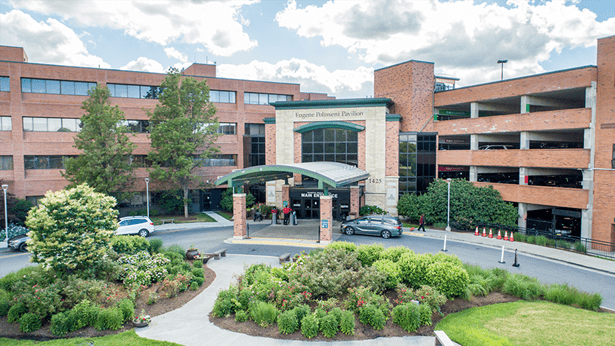The cardiology program at the Sands-Constellation Heart Institute is one of the largest and most comprehensive cardiology programs in New York State. Our team offers the clinical and support resources you need for a lifetime of good cardiac health, and we stay at the forefront of research and innovation in the field of heart health. We work closely with referring physicians and other specialists—including our own nationally recognized heart surgeons —to ensure you receive safe, effective, and compassionate cardiac care.
Our heart team diagnoses and treats heart rhythm disorders, heart failure, coronary disease, valve disease, and complex, chronic conditions. We also help address cholesterol, diabetes, and high blood pressure. Our cardiologists use the latest in diagnostic technology to evaluate and diagnose heart disorders and offer a full range of non-invasive cardiology testing services.
No two cardiology treatment strategies are the same. During your first visit to the Sands-Constellation Heart Institute, our heart care team will help you develop a personalized strategy that best fits your lifestyle. We will thoroughly:
Discuss any family history of illness
Echocardiograms (echos), stress tests, and dobutamine echos are non-invasive techniques that safely and quickly assess your risk for heart disease. There is no pain associated with these testing procedures, and they help cardiologists learn valuable information about your heart’s rhythm and blood flow.
Benefits of an echocardiogram
Learn More About Stress Testing and Echocardiograms
Heart monitoring and EKGs (electrocardiograms) evaluate how your heart is functioning and how well it’s pumping blood through your body.
Types of EKGs include:
The Sands-Constellation Heart Institute also provides the following cardiac testing options:
Our skilled cardiologists treat all types of common and rare heart problems and disorders.
Aortic Aneurysms - An aortic aneurysm is an abnormal bulge that forms in the walls of the aorta (your largest blood vessel) when the walls of the aorta weaken. The two types of aortic aneurysms are abdominal and thoracic aneurysms. Signs of an aortic aneurysm include chest or back pain, difficulty breathing, coughing, and shortness of breath.
Arrhythmia (heart palpitations) - An arrhythmia occurs when the heartbeat beats irregularly, either beating too fast, too slowly, or at an irregular rate. There are often no signs or symptoms of an irregular heartbeat, but you may feel faint, dizzy or have difficulty breathing. An electrocardiogram (EKG or ECG) is the most common test used to diagnose an arrhythmia.
Coronary Artery Disease – The coronary arteries are the blood vessels that carry blood to your heart. Coronary artery disease is the narrowing or the blockage of these arteries. It is often caused by atherosclerosis, which is the build-up of cholesterol or plaque (also called fatty deposits) inside the arteries. Some people with coronary artery disease have no symptoms, and others may experience chest pain, nausea or indigestion, lightheadedness, sweating, and an increased heart rate.
Heart Failure – Heart failure is when your heart isn’t pumping enough blood to meet the body’s need for blood and oxygen. Congestive heart failure is a type of heart failure that requires timely medical attention.
Heart Valve Disorders – If you’re suffering from a heart valve disorder, one of the four valves in your heart isn’t working properly. The valves keep blood flowing in the correct direction, and disorders can cause blood flow to be disrupted. Symptoms include an abnormal sound (heart murmur), chest pain, dizziness, fainting, fatigue, and swelling of your ankles and feet.
High Blood Pressure (hypertension) – Your blood pressure is determined by the amount of blood your heart pumps and the amount of resistance to blood flow in your arteries. The narrower your arteries and the more blood your heart pumps, the higher your blood pressure will be. Hypertension can occur for many years without obvious symptoms and increases your risk of both heart attack and stroke.
Lipid Disorders (high cholesterol) – The fats that circulate throughout your bloodstream are called lipids, and include low-density lipoproteins (LDL), high-density lipoproteins (HDL), and triglycerides. LDL, or bad cholesterol, contributes to plaque buildup in your arteries and can increase your risk of heart attack and stroke. HDL, or good cholesterol, helps remove LDL from the blood and effectively prevents the formation of plaque and fatty buildup.
Vascular Diseases – When your heart beats, it pumps blood through your blood vessels or tubes that carry blood to every inch of your body and consist of arteries (carry blood away from the heart) and veins (carry blood back to the heart). Conditions include peripheral artery disease, carotid artery disease, blood clots, aortic aneurysms, and venous diseases.
In order to provide our patients with quick access to care, we now offer existing cardiology patients same-day appointments with our experienced Advanced Practice Providers (APPs). Appointments are available Monday through Friday for non-emergent symptoms like palpitations, non-active chest pain, fatigue, edema, shortness of breath, and hypertension. Call (585) 442-5320 or message in MyCare to request an appointment.

Rochester General Hospital has been named a 2022-2023 High Performing hospital for heart attack treatment by U.S. News & World Report. This is the highest award a hospital can earn for U.S. News’ Best Hospitals Procedures & Conditions ratings.

In the days leading up to your appointment or procedure, you may feel overwhelmed. There are many important details that contribute to a successful experience. Our team will be by your side through it all!
How to Prepare for a Cardiology Appointment